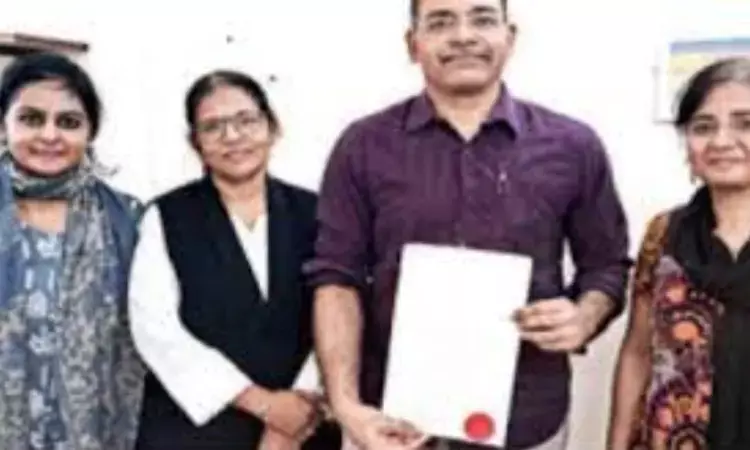- Home
- Medical news & Guidelines
- Anesthesiology
- Cardiology and CTVS
- Critical Care
- Dentistry
- Dermatology
- Diabetes and Endocrinology
- ENT
- Gastroenterology
- Medicine
- Nephrology
- Neurology
- Obstretics-Gynaecology
- Oncology
- Ophthalmology
- Orthopaedics
- Pediatrics-Neonatology
- Psychiatry
- Pulmonology
- Radiology
- Surgery
- Urology
- Laboratory Medicine
- Diet
- Nursing
- Paramedical
- Physiotherapy
- Health news
- Fact Check
- Bone Health Fact Check
- Brain Health Fact Check
- Cancer Related Fact Check
- Child Care Fact Check
- Dental and oral health fact check
- Diabetes and metabolic health fact check
- Diet and Nutrition Fact Check
- Eye and ENT Care Fact Check
- Fitness fact check
- Gut health fact check
- Heart health fact check
- Kidney health fact check
- Medical education fact check
- Men's health fact check
- Respiratory fact check
- Skin and hair care fact check
- Vaccine and Immunization fact check
- Women's health fact check
- AYUSH
- State News
- Andaman and Nicobar Islands
- Andhra Pradesh
- Arunachal Pradesh
- Assam
- Bihar
- Chandigarh
- Chattisgarh
- Dadra and Nagar Haveli
- Daman and Diu
- Delhi
- Goa
- Gujarat
- Haryana
- Himachal Pradesh
- Jammu & Kashmir
- Jharkhand
- Karnataka
- Kerala
- Ladakh
- Lakshadweep
- Madhya Pradesh
- Maharashtra
- Manipur
- Meghalaya
- Mizoram
- Nagaland
- Odisha
- Puducherry
- Punjab
- Rajasthan
- Sikkim
- Tamil Nadu
- Telangana
- Tripura
- Uttar Pradesh
- Uttrakhand
- West Bengal
- Medical Education
- Industry
Dying with Dignity: Mumbai based Gynaecologist first to notarise living will

Mumbai: Setting an example for others to follow, a Mumbai-based gynecologist, Dr Nikhil Datar, has notarised his ‘living will.’ The doctor's living will states that if he ever has an “incurable, irreversible illness” or becomes unconscious due to accidental circumstances, he would not undergo treatments to stay alive artificially with the help of machines.
A living will, which outlines a person's wishes for future medical care, opens the door to passive euthanasia that involves forgoing life-prolonging measures like feeding tubes and ventilators. The doctors stated that the advocate was surprised as it was the first time to notarise a living will.
In order to serve his will as a reference, Dr Datar posted a copy of it on social media. Palliative treatment will also be promoted by Dr. Datar's surviving family. It states that the physician should give the “necessary dose so as to provide maximum pain relie.”. Although such medicines could lead to respiratory depression, he said that he wanted palliative care to “maintain my dignity till I die.”
“Dying has become difficult to some extent due to progress in medical science. However, if I am diagnosed to have a disease that causes severe impairment of physical and mental functions such as dementia, I wouldn’t like to undergo treatment that is meaningless,” Dr Datar told a daily. The living will provide a basic structure for relatives/ family members as well as for doctors in difficult times. "Doctors are bound by medical ethics to prolong life, and relatives are usually divided about the future course of treatment," said Dr Datar.
He said that by submitting a copy to the municipal commissioner, he was ensuring that others did the same and that the "campaign" for a decent death would gain ground. Roop Gursahani, a consultant neurologist and a member of the panel that provided advice to the Supreme Court in the Aruna Shanbaug case, discussed the most recent changes made by the court and noted that while we were initially forty years behind the developed world in recognizing patient autonomy, we are now only twenty years behind.
The United States permitted patient autonomy in deaths since the 1980s. “By the end of the eighties, any patient who came to a federally run hospital had to be asked about a living will or advised on it,” Dr Gursahani told Times Now. He continued by saying that having a living will gives people power over their final days. He continued, "The remaining progress rests on individuals using their rights. Our Supreme Court has authorized this," he added.
Sanchari Chattopadhyay has pursued her M.A in English and Culture Studies from the University of Burdwan, West Bengal. She likes observing cultural specificities and exploring new places.


